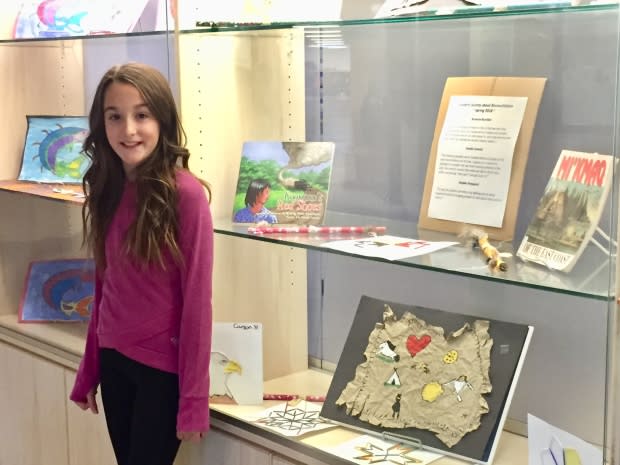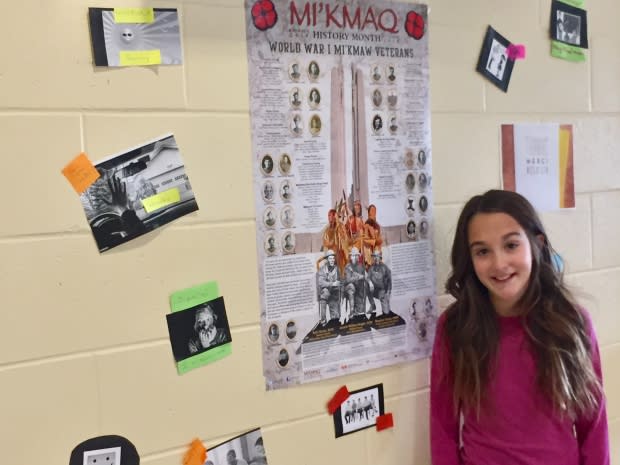3 young Nova Scotians to share thoughts on reconciliation in new textbook
Three young students from Nova Scotia have been selected to share their thoughts on reconciliation in a new social studies book that could be taught in classrooms across the country.
Emelie Lutwick, Hayden Sheppard and Breanna Boutilier were among some 70 students at Enfield District School last year who worked with three teachers, including Grade 5 teacher Jacob Gale, on an initiative to learn about reconciliation and Indigenous history in Canada.
Gale, who grew up on the Eskasoni First Nation, shared stories from Mi'kmaw elders and survivors about their experiences in residential schools and the legacy of the abuse many suffered.
"When we went into a little more detail, I think that students were not aware at all about some of the stories and about that history piece, about what had happened to that relationship with Mi'kmaw people and Treaty people."
"It gives us a chance to apologize to people that we have treated unfairly in the past." - Emelie Lutwick, Grade 5
Hearing what the young students had to say about what they learned was a "humbling experience," said Gale, who serves as co-ordinator for Mi'kmaw education and services with the Halifax Regional Centre for Education.
"Just to hear the words that they shared and their deep meaning at such a young age, about what reconciliation is, was really beautiful."

Those words will soon appear in Time for Change, a Scholastic Canada book for grades 6-8 that will be available in winter 2019. It will also feature quotes from students in Ontario, Nova Scotia and New Brunswick.
The book will be part of Take Action for Reconciliation, a social studies resource for students in grades 4-8 that will be sold in the school market Canada-wide.
'Unfair and wrong'
"First Nations peoples were treated with no respect at all, and reconciliation can fix that," reads Emelie's quote in the upcoming book.
"It gives us a chance to apologize to people that we have treated unfairly in the past. We need to realize that what we did to them was unfair and wrong. They can't 'just get over it!'"
"The way my actions can help is by talking about what happened and encouraging people to talk about that part of history." - Hayden Sheppard, Grade 6
Emelie, who is now in Grade 5 at Enfield District School, is of Mi'kmaw descent. Working on this project, she said, gave her a chance to express how she feels about reconciliation and residential schools.

"It was a little scary to think that kids were taken out of their homes and sent somewhere different where they were abused and not treated very well," she said in an interview.
All Canadians, she said, "could learn to really treat people, no matter what their race, with respect."
Hayden, who is now in Grade 6 at Riverside Education Centre in Milford, is also of Mi'kmaw descent. His quote that was selected for the book highlights the importance of confronting the past.
"The way my actions can help is by talking about what happened and encouraging people to talk about that part of history," he wrote.

Talking about what happened
Breanna wrote that for her, reconciliation means "that we are now talking about what has happened to Indigenous people. Before people would not talk about it, and now we are one step closer to making the world a better place."

Tina Knol, principal of Enfield District School, said she was not surprised the three students selected for the book were able to share how they feel about things that have happened in Nova Scotia and in Canada.
"Before people would not talk about it, and now we are one step closer to making the world a better place." - Breanna Boutilier, Grade 6
"Our students just have that very honest approach to understanding what's happened and can express how they feel about that," said Knol.
There are just over 260 students at Enfield District School with a small number of Indigenous students. Mi'kmaw history and culture is part of the school's curriculum all year long.

